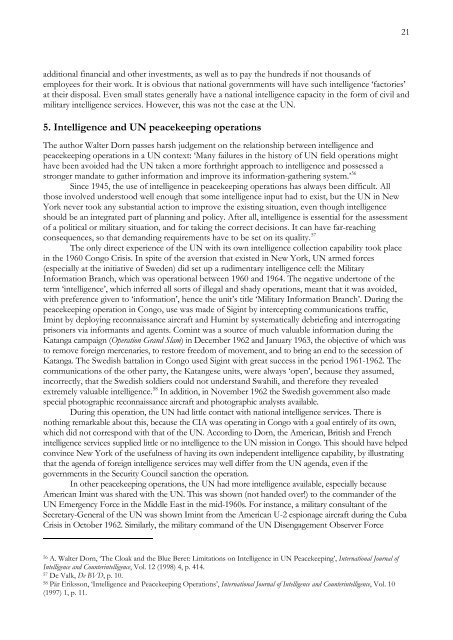C. Wiebes - Intelligence en de oorlog in Bosnië 1992-1995. De rol van de inlichtingen- en veiligheidsdiensten - Engels
C. Wiebes - Intelligence en de oorlog in Bosnië 1992-1995. De rol van de inlichtingen- en veiligheidsdiensten - Engels
C. Wiebes - Intelligence en de oorlog in Bosnië 1992-1995. De rol van de inlichtingen- en veiligheidsdiensten - Engels
- No tags were found...
Create successful ePaper yourself
Turn your PDF publications into a flip-book with our unique Google optimized e-Paper software.
21additional f<strong>in</strong>ancial and other <strong>in</strong>vestm<strong>en</strong>ts, as well as to pay the hundreds if not thousands ofemployees for their work. It is obvious that national governm<strong>en</strong>ts will have such <strong>in</strong>tellig<strong>en</strong>ce ‘factories’at their disposal. Ev<strong>en</strong> small states g<strong>en</strong>erally have a national <strong>in</strong>tellig<strong>en</strong>ce capacity <strong>in</strong> the form of civil andmilitary <strong>in</strong>tellig<strong>en</strong>ce services. However, this was not the case at the UN.5. <strong>Intellig<strong>en</strong>ce</strong> and UN peacekeep<strong>in</strong>g operationsThe author Walter Dorn passes harsh judgem<strong>en</strong>t on the relationship betwe<strong>en</strong> <strong>in</strong>tellig<strong>en</strong>ce andpeacekeep<strong>in</strong>g operations <strong>in</strong> a UN context: ‘Many failures <strong>in</strong> the history of UN field operations mighthave be<strong>en</strong> avoi<strong>de</strong>d had the UN tak<strong>en</strong> a more forthright approach to <strong>in</strong>tellig<strong>en</strong>ce and possessed astronger mandate to gather <strong>in</strong>formation and improve its <strong>in</strong>formation-gather<strong>in</strong>g system.’ 56S<strong>in</strong>ce 1945, the use of <strong>in</strong>tellig<strong>en</strong>ce <strong>in</strong> peacekeep<strong>in</strong>g operations has always be<strong>en</strong> difficult. Allthose <strong>in</strong>volved un<strong>de</strong>rstood well <strong>en</strong>ough that some <strong>in</strong>tellig<strong>en</strong>ce <strong>in</strong>put had to exist, but the UN <strong>in</strong> NewYork never took any substantial action to improve the exist<strong>in</strong>g situation, ev<strong>en</strong> though <strong>in</strong>tellig<strong>en</strong>ceshould be an <strong>in</strong>tegrated part of plann<strong>in</strong>g and policy. After all, <strong>in</strong>tellig<strong>en</strong>ce is ess<strong>en</strong>tial for the assessm<strong>en</strong>tof a political or military situation, and for tak<strong>in</strong>g the correct <strong>de</strong>cisions. It can have far-reach<strong>in</strong>gconsequ<strong>en</strong>ces, so that <strong>de</strong>mand<strong>in</strong>g requirem<strong>en</strong>ts have to be set on its quality. 57The only direct experi<strong>en</strong>ce of the UN with its own <strong>in</strong>tellig<strong>en</strong>ce collection capability took place<strong>in</strong> the 1960 Congo Crisis. In spite of the aversion that existed <strong>in</strong> New York, UN armed forces(especially at the <strong>in</strong>itiative of Swed<strong>en</strong>) did set up a rudim<strong>en</strong>tary <strong>in</strong>tellig<strong>en</strong>ce cell: the MilitaryInformation Branch, which was operational betwe<strong>en</strong> 1960 and 1964. The negative un<strong>de</strong>rtone of theterm ‘<strong>in</strong>tellig<strong>en</strong>ce’, which <strong>in</strong>ferred all sorts of illegal and shady operations, meant that it was avoi<strong>de</strong>d,with prefer<strong>en</strong>ce giv<strong>en</strong> to ‘<strong>in</strong>formation’, h<strong>en</strong>ce the unit’s title ‘Military Information Branch’. Dur<strong>in</strong>g thepeacekeep<strong>in</strong>g operation <strong>in</strong> Congo, use was ma<strong>de</strong> of Sig<strong>in</strong>t by <strong>in</strong>tercept<strong>in</strong>g communications traffic,Im<strong>in</strong>t by <strong>de</strong>ploy<strong>in</strong>g reconnaissance aircraft and Hum<strong>in</strong>t by systematically <strong>de</strong>brief<strong>in</strong>g and <strong>in</strong>terrogat<strong>in</strong>gprisoners via <strong>in</strong>formants and ag<strong>en</strong>ts. Com<strong>in</strong>t was a source of much valuable <strong>in</strong>formation dur<strong>in</strong>g theKatanga campaign (Operation Grand Slam) <strong>in</strong> <strong>De</strong>cember 1962 and January 1963, the objective of which wasto remove foreign merc<strong>en</strong>aries, to restore freedom of movem<strong>en</strong>t, and to br<strong>in</strong>g an <strong>en</strong>d to the secession ofKatanga. The Swedish battalion <strong>in</strong> Congo used Sig<strong>in</strong>t with great success <strong>in</strong> the period 1961-1962. Thecommunications of the other party, the Katangese units, were always ‘op<strong>en</strong>’, because they assumed,<strong>in</strong>correctly, that the Swedish soldiers could not un<strong>de</strong>rstand Swahili, and therefore they reveale<strong>de</strong>xtremely valuable <strong>in</strong>tellig<strong>en</strong>ce. 58 In addition, <strong>in</strong> November 1962 the Swedish governm<strong>en</strong>t also ma<strong>de</strong>special photographic reconnaissance aircraft and photographic analysts available.Dur<strong>in</strong>g this operation, the UN had little contact with national <strong>in</strong>tellig<strong>en</strong>ce services. There isnoth<strong>in</strong>g remarkable about this, because the CIA was operat<strong>in</strong>g <strong>in</strong> Congo with a goal <strong>en</strong>tirely of its own,which did not correspond with that of the UN. Accord<strong>in</strong>g to Dorn, the American, British and Fr<strong>en</strong>ch<strong>in</strong>tellig<strong>en</strong>ce services supplied little or no <strong>in</strong>tellig<strong>en</strong>ce to the UN mission <strong>in</strong> Congo. This should have helpedconv<strong>in</strong>ce New York of the usefulness of hav<strong>in</strong>g its own <strong>in</strong><strong>de</strong>p<strong>en</strong>d<strong>en</strong>t <strong>in</strong>tellig<strong>en</strong>ce capability, by illustrat<strong>in</strong>gthat the ag<strong>en</strong>da of foreign <strong>in</strong>tellig<strong>en</strong>ce services may well differ from the UN ag<strong>en</strong>da, ev<strong>en</strong> if thegovernm<strong>en</strong>ts <strong>in</strong> the Security Council sanction the operation.In other peacekeep<strong>in</strong>g operations, the UN had more <strong>in</strong>tellig<strong>en</strong>ce available, especially becauseAmerican Im<strong>in</strong>t was shared with the UN. This was shown (not han<strong>de</strong>d over!) to the comman<strong>de</strong>r of theUN Emerg<strong>en</strong>cy Force <strong>in</strong> the Middle East <strong>in</strong> the mid-1960s. For <strong>in</strong>stance, a military consultant of theSecretary-G<strong>en</strong>eral of the UN was shown Im<strong>in</strong>t from the American U-2 espionage aircraft dur<strong>in</strong>g the CubaCrisis <strong>in</strong> October 1962. Similarly, the military command of the UN Dis<strong>en</strong>gagem<strong>en</strong>t Observer Force56 A. Walter Dorn, ‘The Cloak and the Blue Beret: Limitations on <strong>Intellig<strong>en</strong>ce</strong> <strong>in</strong> UN Peacekeep<strong>in</strong>g’, International Journal of<strong>Intellig<strong>en</strong>ce</strong> and Counter<strong>in</strong>tellig<strong>en</strong>ce, Vol. 12 (1998) 4, p. 414.57 <strong>De</strong> Valk, <strong>De</strong> BVD, p. 10.58 Pär Eriksson, ‘<strong>Intellig<strong>en</strong>ce</strong> and Peacekeep<strong>in</strong>g Operations’, International Journal of <strong>Intellig<strong>en</strong>ce</strong> and Counter<strong>in</strong>tellig<strong>en</strong>ce, Vol. 10(1997) 1, p. 11.





